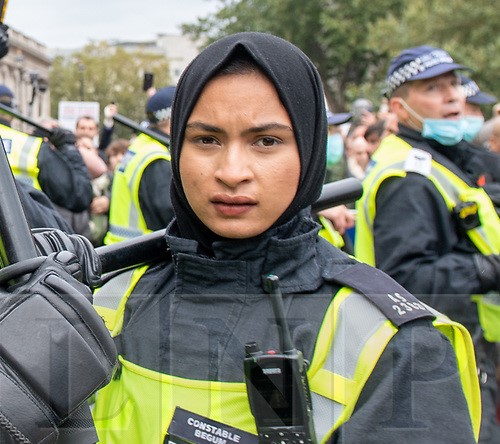Ruby Begum: A Deep Dive into the Controversial Misconduct Hearing of a Metropolitan Police Officer

Ruby Begum, once a prominent Civil Servant within the Metropolitan Police, made headlines for her involvement in a misconduct hearing that eventually led to her dismissal from the force. This article provides an in-depth look at her career, the controversies surrounding her, and the outcome of her misconduct hearing. It also delves into the implications of her actions on public trust and the police force, shedding light on the broader conversations about accountability in law enforcement.
Introduction to Ruby Begum
Ruby Begum was a police officer with the Metropolitan Police, holding the rank of Constable. Prior to joining the force, she worked in various roles, including sales supervisor positions at Superdrug and BlueInc Group. Begum’s journey in the police force began in 2014, when she joined as a Special Constable. She later transitioned into a full-time position in 2016, where she was stationed in the Taskforce, focusing on public order policing.
Her career trajectory took a sharp turn when her social media activity came under scrutiny, eventually resulting in a misconduct hearing that concluded with her dismissal from the force. This case has since raised questions about the standards of conduct for public service officers, especially those in positions of authority.
Ruby Begum’s Rise within the Metropolitan Police
Ruby Begum joined the Metropolitan Police with a passion for criminology and public service. She had earned her degree in criminology and criminal justice from the University of East London, a background that would complement her work in law enforcement. Upon becoming a full-time police officer, she was praised for her dedication and commitment to her duties. She worked on high-profile cases and was particularly noted for her involvement in policing public protests and demonstrations.
Her public-facing role required her to maintain a professional image and uphold the values of the Metropolitan Police. However, it was Begum’s actions outside of work that would ultimately bring her career to a grinding halt.
The Social Media Controversy: A Turning Point
Between 2013 and 2019, Ruby Begum posted over 25,000 tweets on her Twitter account (@ruby_beee). Unfortunately, some of these posts were deemed offensive and discriminatory, specifically targeting Jewish individuals, non-Muslims, and Pakistanis. Begum’s tweets included derogatory terms such as “dirty Zionists” to describe Jewish people and “kuffar” to refer to non-believers. These posts, which were often inflammatory, raised concerns about her ability to perform her duties impartially.
One of the most contentious tweets came after the September 11 attacks, where she wrote, “You must be stupid if you think I’m gonna do 2 minutes silence for 9/11.” These statements attracted significant media attention, particularly as they were in stark contrast to the values the police force is expected to uphold.
Despite her apology and claims of personal growth, these posts were viewed as a reflection of deep-seated personal beliefs that were incompatible with her role in law enforcement. The impact on public trust was significant, and the decision was made to hold a misconduct hearing to address her actions.
The Misconduct Hearing: A Detailed Review
The misconduct hearing that took place in 2024 was a pivotal moment in Ruby Begum’s career. During the hearing, the panel examined Begum’s social media activity and concluded that her posts were “derogatory,” “abusive,” and indicative of personal beliefs that could undermine public trust in the police force. The hearing revealed that her actions went beyond immaturity or momentary lapses in judgment. Rather, they were indicative of her deep-seated attitudes, which were deemed incompatible with her duties as a public servant.
The panel found that her social media activity had the potential to harm the reputation of the Metropolitan Police, erode public confidence, and jeopardise the safety of individuals within the communities she served. Despite Begum’s claims of having learned from her past mistakes and her apology for the posts, the decision to dismiss her from the force was made. She was terminated without notice, a decision that left a lasting impact on her career and the police force.
PC Ruby Begum Misconduct Outcome
The outcome of the misconduct hearing was clear: Ruby Begum was dismissed from the Metropolitan Police, effectively ending her career in law enforcement. The misconduct hearing’s findings highlighted the importance of maintaining a high standard of conduct for all police officers, especially those in positions of authority.
While the decision was harsh, it was seen as a necessary step to maintain the integrity of the police force and to send a message that discriminatory behaviour would not be tolerated. The outcome also underscored the growing importance of online conduct in the age of social media, where personal actions can have far-reaching consequences.
The Public’s Reaction to Ruby Begum’s Dismissal
The dismissal of Ruby Begum prompted mixed reactions from the public. Some supported the decision, arguing that her social media activity was incompatible with the role of a police officer, particularly in a diverse city like London. Others, however, questioned whether the punishment was too severe, with some suggesting that the issue could have been addressed with a warning or suspension instead of immediate dismissal.
Regardless of the differing opinions, one thing was clear: the case raised important questions about the conduct expected from public servants, particularly in positions of authority. It also highlighted the need for clear guidelines regarding the use of social media by officers and other public sector workers.
The Broader Implications of Ruby Begum’s Case
Ruby Begum’s case has broader implications for the police force and public service roles in general. In an increasingly digital world, where personal opinions can easily be shared on social media platforms, it is essential for public servants to maintain a high standard of conduct both online and offline. This case serves as a reminder of the importance of professionalism, impartiality, and accountability for those who hold positions of authority in law enforcement.
PC Ruby Begum and Police Accountability
The dismissal of PC Ruby Begum is a testament to the growing importance of police accountability. Public trust in the police is crucial to maintaining law and order, and any actions that undermine that trust can have far-reaching consequences. The case serves as a reminder that police officers must adhere to the highest standards of conduct, both in their professional duties and in their personal lives.
The Metropolitan Police, like other law enforcement agencies, must ensure that its officers are held accountable for their actions, particularly when those actions contradict the values of the force. The importance of police officers being role models for the public cannot be overstated, and any deviation from this standard can harm the reputation of the entire police service.
Conclusion
Ruby Begum’s rise through the ranks of the Metropolitan Police, followed by her dismissal over controversial social media activity, serves as a cautionary tale about the importance of maintaining professional conduct at all times. Her case has sparked important discussions about police accountability, social media conduct, and the standards expected from public servants.
As the debate continues, one thing remains certain: the actions of public servants must align with the values of the organisations they represent. Ruby Begum’s misconduct hearing and its outcome reinforce the idea that integrity, professionalism, and accountability are key to maintaining trust in law enforcement and public service.



